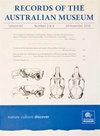Amazing diversity of Nothria (Annelida, Onuphidae) in the Australian deep sea
IF 0.8
4区 生物学
Q4 ZOOLOGY
引用次数: 0
Abstract
The epibenthic onuphid genus Nothria Malmgren, 1867 presently comprises 21 accepted species. We are reporting here on specimens collected during six deep-sea expeditions of the RV Investigator from 2015–2018 to the Great Australian Bight (GAB) and off eastern Australia from Tasmania to Queensland, describing eight new species of Nothria. This is the first integrated study of the genus, sequencing the markers COI, 16S rDNA and 28S rDNA from 37 specimens and employing conventional and exploratory morphological characters as well as tube consistency and structure for identification. Molecular data provided strong support for recognition of the eight new species and the Nothria otsuchiensis Imajima, 1986 species complex. Since the analysis of morphology between the specimens of this complex has not revealed any obvious differences, it may represent a complex of cryptic species. Nothria digitata sp. nov. was collected at a depth of 400 m whilst the remaining seven new species are from depths of 980–2751 m. Nothria deltasigma sp. nov., N. digitata sp. nov. and N. minima sp. nov. were collected at a single station each, while N. josae sp. nov. and N. simplex sp. nov. were found at two stations. However, N. delta sp. nov. displayed the widest distribution, occurring at GAB, Tasmania and Jervis Bay Marine Park, NSW. Most stations yielded only one species, Jervis Bay Marine Park and south of Brians, Tasmania, harboured two, but an astounding example of sympatry was discovered at Huon Marine Park, Tasmania, where three species, N. delta sp. nov., N. lizae sp. nov. and N. orensanzi sp. nov. were collected together in one station.澳大利亚深海中令人惊叹的Nothria(环节动物,Onuphidae)的多样性
底栖鱼属Nothria Malmgren, 1867年,目前包括21个公认的物种。我们在这里报告了RV调查员从2015-2018年到大澳大利亚湾(GAB)和澳大利亚东部从塔斯马尼亚到昆士兰的6次深海探险中收集的标本,描述了8种新的Nothria物种。这是对该属的首次综合研究,对37个标本的COI、16S rDNA和28S rDNA标记进行了测序,并利用常规和探索性形态学特征、管状一致性和结构进行了鉴定。分子数据为8个新种的鉴定和Nothria otsuchiensis Imajima, 1986种复合体的鉴定提供了有力的支持。由于该复合体标本间的形态分析未发现明显差异,它可能代表一个隐种复合体。Nothria digitata sp. 11 .是在400 m深度采集的,其余7个新种是在980 ~ 2751 m深度采集的。deltasigma sp. 11、digitata sp. 11和minima sp. 11分别在一个站点采集,joseae sp. 11和simplex sp. 11在两个站点采集。然而,N. delta sp. 11 .的分布最广,出现在塔斯马尼亚州的GAB和新南威尔士州的杰维斯湾海洋公园。大多数站点只采集到一种,杰维斯湾海洋公园和塔斯马尼亚的布莱恩斯南部有两种,但在塔斯马尼亚的Huon海洋公园发现了一个令人震惊的例子,在一个站点中发现了三种,N. delta sp. nov, N. lizae sp. nov和N. orensanzi sp. nov。
本文章由计算机程序翻译,如有差异,请以英文原文为准。
求助全文
约1分钟内获得全文
求助全文
来源期刊
CiteScore
0.90
自引率
0.00%
发文量
9
审稿时长
>12 weeks
期刊介绍:
Records of the Australian Museum, volume 62 was published in 2010, volume 63 in 2011. Monographic works of particular significance are published irregularly as Records of the Australian Museum, Supplements (ISSN 0812-7387).

 求助内容:
求助内容: 应助结果提醒方式:
应助结果提醒方式:


